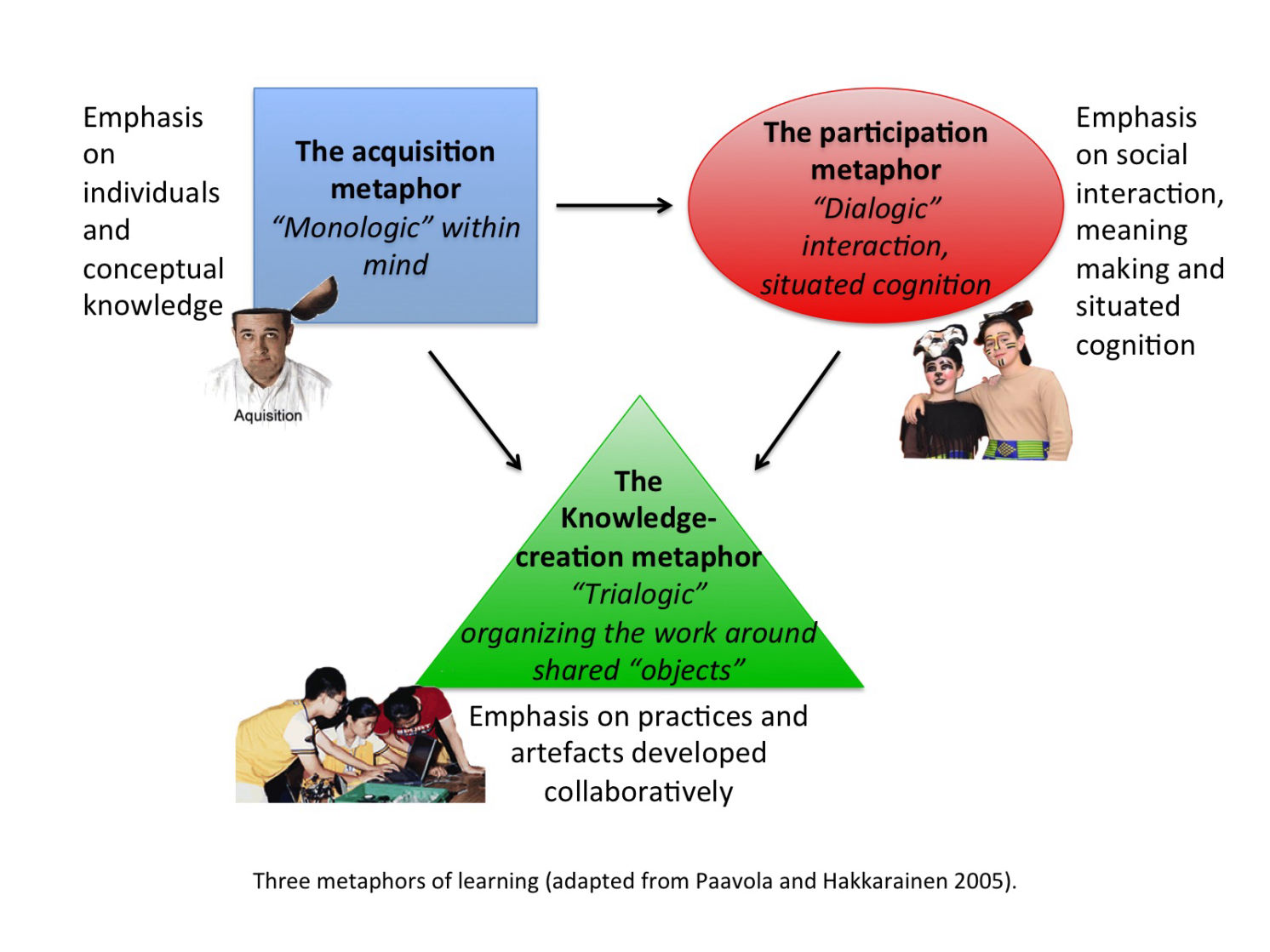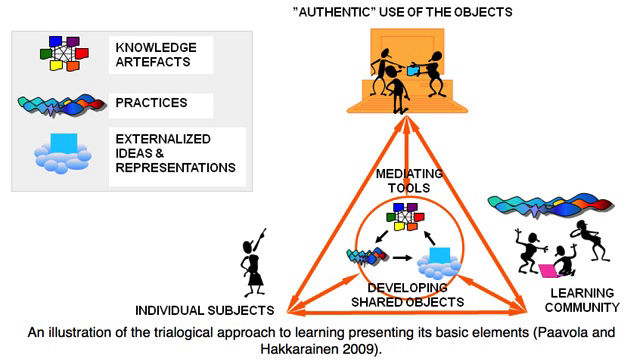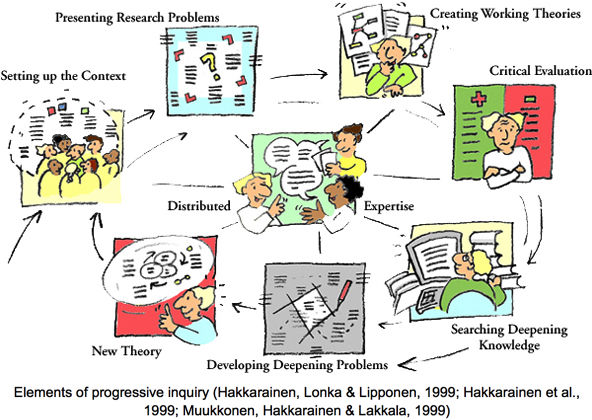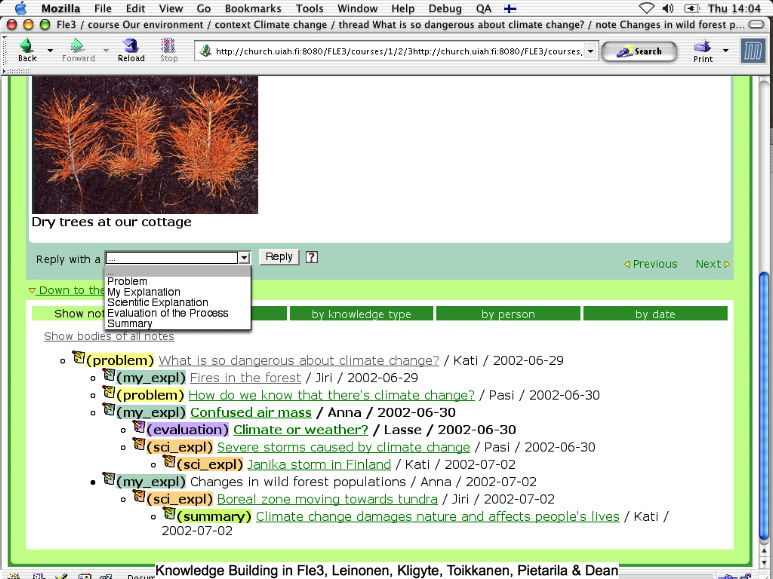References
Paavola, S., Lipponen, L. & Hakkarainen, K. (2002) Epistemological Foundations for CSCL: A Comparison of Three Models of Innovative Knowledge Communities. In Gerry Stahl (ed.) Computer Support for Collaborative Learning: Foundations for a CSCL Community, Proceedings of: CSCL 2002 (January 7-11, 2002, Boulder, Colorado, USA). Distributed by Lawrence Erlbaum Associates, Inc., Hilldale, New Jersey, USA.
Paavola, S., Lipponen, L., & Hakkarainen, K. (2004). Models of Innovative Knowledge Communities and Three
Metaphors of Learning. Review of Educational Research 74(4), 557-576.
Hakkarainen, K., Palonen, T., Paavola, S. & Lehtinen, E. (2004) Communities of networked expertise: Professional and educational perspectives. Amsterdam: Elsevier.
Sfard, A. (1998). On two metaphors for learning and the dangers of choosing just one. Educational Researcher,
27(2), 4–13.
Paavola, S. & Hakkarainen, K. (2009). From meaning making to joint construction of knowledge practices and artefacts – A trialogical approach to CSCL. In C. O'Malley, D. Suthers, P. Reimann, & A. Dimitracopoulou (Eds.), Computer Supported Collaborative Learning Practices: CSCL2009 Conference Proceedings. (pp. 83-92). Rhodes, Creek: International Society of the Learning Sciences (ISLS) (draft available online).
Paavola, S. & Hakkarainen, K. (2005). The Knowledge Creation Metaphor – An Emergent Epistemological Approach to Learning. Science & Education 14(6), 535-557 (draft available online).
Lakkala, M., Paavola, S., Kosonen, K., Muukkonen, H., Bauters, M., & Markkanen, H. (2009). Main functionalities of the Knowledge Practices Environment (KPE) affording knowledge creation practices in education. In C. O'Malley, D. Suthers, P. Reimann, & A. Dimitracopoulou (Eds.), Computer Supported Collaborative Learning Practices: CSCL2009 Conference Proceedings (pp. 297-306). Rhodes, Creek: International Society of the Learning Sciences (ISLS) (draft available online).
Engeström, Y. (1987). Learning by expanding. Helsinki: Orienta-Konsultit.
Scardamalia, M., & Bereiter, C. (1994). Computer support for knowledge-building
communities. Journal of the Learning Sciences, 3(3), 265–283.
Bereiter, C. (2002). Education and mind in the knowledge age. Hillsdale: Erlbaum.
Lonka, K., Hakkarainen, K., & Sintonen, M. (2000) Progressive inquiry learning for children –experiences, possibilities, limitations. European Early Childhood Education Association Journal,8, 7 -23.
Hakkarainen, K., Bollström-Huttunen, M., Pyysalo, R. (2003, April). From project learning to progressive inquiry. A poster presented at a symposium on title "International Design Principles for Knowledge Building: Innovative Learning processes in Knowledge-rich Interactive Environments", the American Educational Research Association (AERA) Annual Meeting, Chicago, USA.
Lipponen, L. (2000). Towards knowledge-building discourse: From facts to explanations in primary students' computer mediated discourse. Learning Environments Research, 3, 179–199.
Lakkala, M., Lallimo, J. and Hakkarainen, K. (2005) Teachers’ pedagogical designs for technology-supported collective inquiry: A national case study. Computers & Education, 45, 337–356. Available online
Lakkala, M., Ilomäki, L., & Palonen, T. (2007). Implementing virtual, collaborative inquiry practices in a middle school context. Behaviour & Information Technology, 26(1), 37–53. Available online
Lakkala, M., Muukkonen, H., Paavola, S., & Hakkarainen, K. (2008). Designing pedagogical infrastructures in university courses for technology-enhanced collaborative inquiry. Research and Practice in Technology Enhanced Learning, 3(1), 33-64. Available online
Muukkonen, Hanni & Lakkala, Minna & Hakkarainen, Kai. (2005). Technology-Mediated Progressive Inquiry in Higher Education.
Hakkarainen, K., Lonka, K., and Lipponen, L. (1999). Tutkivaoppiminen: älykkään toiminnat rajat ja niiden ylittäminen [Progressive Inquiry: Overcoming Limitations of Human Intelligent Activity] (in Finnish). Helsinki: WSOY.
Hakkarainen, K., Lipponen, L., Ilomäki, L, Järvelä, S., Lakkala, M., Muukkonen, H., Rahikainen, M. & Lehtinen, E. (1999). Tieto- ja viestintätekniikka tutkivan oppimisen välineenä [Information and communication technology as a tool in progressive inquiry]. Helsingin kaupungin opetusvirasto. Helsinki: Multiprint.
Muukkonen, H., Hakkarainen, K. & Lakkala, M. (1999) Collaborative Technology for Facilitating Progressive Inquiry: The Future Learning Environment Tools. In C. Hoadley & J. Roschelle (Eds.) The proceedings of the CSCL ’99 conference, December 12-15, 1999, Palo Alto, pp. 406-415. Mahwah, NJ: Lawrence Erlbaum and Associates.
Leinonen, T. & Muukkonen, H (1998). Future Learning Environment – Innovative Methods and Applications for Collaborative Learning. Arttu Magazine. Taideteollinen korkeakoulu 1998.
Leinonen, T., Kligyte, G. et.all (2003). Learning with Collaborative Software – A guide to Fle3. Helsinki, Taideteollinen korkeakoulu 2003. ISBN 951-558-127-3. Translated to Italian and Spanish.



